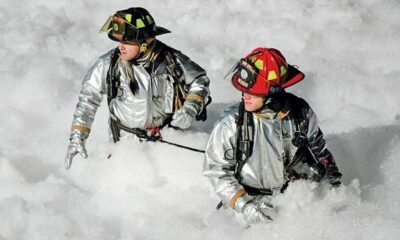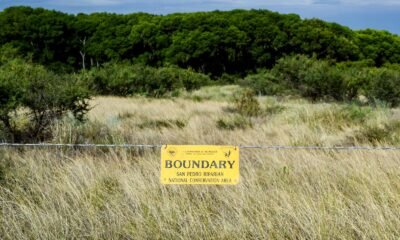arizona
Water Director Seeks $1M in Potential Lawsuit Over Colorado River Sharing Dispute

The head of Arizona’s water agency, Tom Buschatzke, is preparing for potential legal battles over Colorado River water rights as negotiations with other states approach a critical juncture.
He has requested $1 million from Governor Katie Hobbs and state legislators for what he describes as a “set-aside appropriation” to fund possible litigation if a satisfactory agreement is not reached by 2026.
Buschatzke acknowledges that while a collaborative resolution is ideal, uncertainty surrounds the negotiations involving seven states, tribes, and federal agencies. “We don’t want war, we want peace,” he emphasizes, underscoring the importance of a negotiated solution instead of court-imposed outcomes that could severely restrict Arizona’s water access.
Climate change projections signal a drier future, complicating the situation further. “The federal Bureau of Reclamation indicates that we may need to cut an additional 4 million acre-feet annually, on top of existing reductions,” he stated.
Northern states like Colorado, New Mexico, Utah, and Wyoming are resistant to sharing the burden of these cuts, preferring that reductions come from those in the lower basin—namely Arizona, California, and Nevada.
“This could lead to litigation,” Buschatzke warns, noting that the U.S. Supreme Court may become a battleground for water rights disputes. Hence, the financial request aims to prepare Arizona for such legal challenges.
However, the funding request serves a dual purpose: it communicates Arizona’s firm stance against any attempts to marginalize their water rights amidst ongoing negotiations.
Current water operation guidelines will expire in 2025. Buschatzke is engaged in ongoing discussions with other states to maintain Arizona’s entitlement of 2.8 million acre-feet annually. An acre-foot typically supplies three households for a year, representing Arizona’s claim within the total allocation of 15 million acre-feet for the river.
In practice, lower basin states have not fully utilized their allocations for several years due to persistent drought conditions. For instance, Arizona is currently using only about 1.9 million acre-feet of its share while voluntarily conserving water in Lake Mead.
The Bureau of Reclamation is set to release an Environmental Impact Statement next month, detailing expected water availability from the Colorado River.
Buschatzke advocates for a balanced approach to water allocation, suggesting that half of any additional cuts should be shouldered by upper basin states to lessen the impact on lower basin states. “It’s crucial that all states contribute fairly to the solution,” he asserts.
Despite this, upper basin states appear unwilling to cooperate, preferring to maintain higher water levels in Lake Powell, which could adversely affect accessibility for Lake Mead.
Buschatzke calls for a long-term agreement lasting at least 20 years, rather than temporary measures that could jeopardize future water access for Arizona.
His request for $1 million also reflects a commitment to thorough preparation for various potential outcomes, including scenarios where Arizona could suffer significant water access limitations.
A spokesperson for Governor Hobbs has indicated that a decision on the funding request will be made when she presents her budget to the Legislature in January.
Failing to secure these funds could leave Arizona vulnerable should negotiations fall through. “We need to be ready for legal action to protect our Colorado River entitlement,” Buschatzke warns, emphasizing the stakes involved.


















